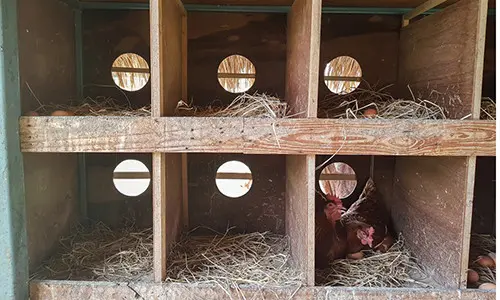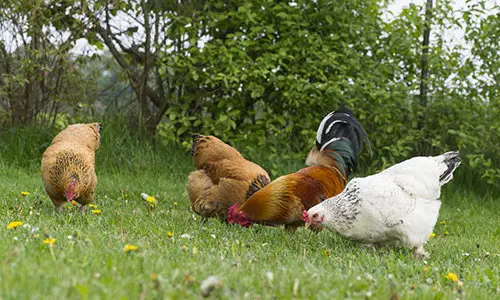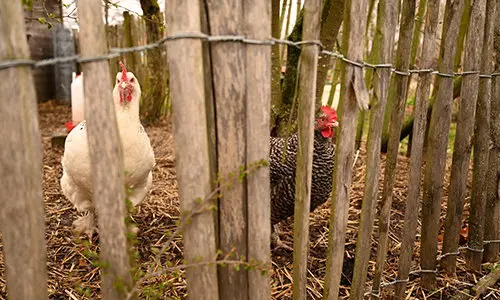Volunteering on a farm for two months changed several aspects of my life.
One amongst them was the fact that I decided it was time for me to keep backyard chickens. The farm I volunteered at was an organic dairy farm, where I worked closely with goats, spending my day grazing, and milking them, and later making cheese. The goats were great company, but one of the highlights in my daily routine was to let the chickens out of their coop every morning and collect fresh eggs.
I was fascinated at how easy and fuss-free they were, and the fact that they loved kitchen scraps always gave me an extra reason to visit them after every meal.
Soon after my volunteering stint ended, I decided that nothing beats fresh eggs for breakfast, and it was time for me to keep my own brood of chickens in my backyard.
It has now been almost a decade, with ups and downs and dry spells without eggs – while I keep learning tricks of trade, here are some quick tips for you to keep healthy chickens that lay more eggs, and more importantly, how to get the tastiest eggs from your own backyard!
The Coop
The first thing you need to look at is their living space – a comfortable living space will help raise healthy chicken, which in turn results in lots of delicious eggs. Keep in mind the seasons, and if you have a severe winter, make sure the coop stays warm, and well-ventilated.
Keep the coop clean, I make sure the coop is cleaned every day for my hens, but at least do it three times per week. Chicken poop can have an overbearing smell and being confined in the coop surrounded with the smell of ammonia would be unpleasant for your birds.
The winters would be more crucial, and if the coop is not ventilated well, make sure it is cleaned every day.
My personal experience with chickens has also gotten me accustomed to a few dry spells when the weather changes, and I allow my hens to adapt to the changing climate. It makes me relish the eggs more when they start laying again. However, you could increase the yield by creating constant conditions in the coop. If you have very short winter days, you could install artificial lighting to increase the “daylight” your chickens are exposed to. This would give them the impression of longer days, thus giving you more eggs!
My chickens are free ranging, they are allowed to roam and forage through the day, and they return to the coop in the evening, where they have perches for the night. Make sure there are enough perches, which are at a height as that is what they would prefer to roost. Ensure there is adequate space for your chickens without overcrowding!

Nest Boxes
I have nooks created close to the perches that my chickens use to lay eggs. This is not where they sleep at night, which helps me make sure they do not get into the habit of sitting on their eggs, and it is much easier for me to collect the eggs every day.
The nesting boxes could be crates or basket or any upcycled container – make sure it is cozy and clean, and free from distraction.
Since my hens roam free, they need to feel safe when they nest, so their nesting baskets are in isolated corners where they would be safe from predators, kids, dogs or any other distractions. It helps to have a lot of dry herbs in the nesting box – rosemary, peppermint, lavender, parsley, marigold.
This keeps the nesting box smelling nice, and a lot of these herbs have repellent properties, keeping mites and fleas away. Make sure you have at least one nesting box for every 2-3 chickens, so that you do not run out of space.
Related: The Best Chicken Breeds for Your Homestead

A Healthy Diet
To get a regular supply of tasty eggs, it is crucial that your chickens have a healthy diet.
Once the chickens are old enough to lay eggs, they would need a higher intake of protein and calcium in their diet. Make sure their meal contains about 15% protein and include some high protein treats in their diet.
The source of protein could be seeds, worms, or even scrambled eggs. Free ranging chickens would have the added advantage of being able to forage for their food, giving them access to insects and worms from the ground. A varied diet helps them stay healthier, and my observation is that the eggs have a beautiful orange yolk.
To make sure the eggshells are not too thin, ensure that there is adequate calcium intake. Chickens like to peck on oyster shells, or even crushed eggshells. Free ranging chickens would know how to access calcium sourced from insect shells, or even from the dirt. They’re smart and would know how much their body needs – they’ll only eat as much as they need, so do not mix the calcium with their food or they may end up eating too much calcium!
Make sure your chickens have access to clean water – and be sure to refill the water frequently, especially in the summers.
Overall, a diverse diet is great for their health, so feel free to give them vegetable scraps from your kitchen and ends of fruit. They will eat what they like, and the rest converts into compost.

Their Daily Routine
Like all pets, a routine is important to keep them healthy. If you have a run for your chickens, let them out regularly so that they get exercised. The more space they have generally results in better health and more less stress. Stress-free chickens will lay more eggs.
Make sure they feel secure, safe from predators, and they aren’t chased by dogs or kids. Other factors that could stress them would be injury, illness or an imbalanced or insufficient diet.
The routine is just important for you as well – follow a schedule with their food and activity. And make sure you collect eggs regularly, preferably twice a day, to make sure they don’t eat their own eggs.
Related: Recognizing And Treating Common Chicken Diseases

Choosing Your Brood
Finally, despite all best practices, the egg yield depends on the type of chicken you keep.
Choose an egg laying breed that typically lays 300+ eggs per year. And plan the size of your brood to make sure you have enough eggs to provide you with a steady supply. Some extra yield is always appreciated by grateful neighbors!
Think about whether you would like to include a rooster in your brood.
They are noisy and can be fierce, but I have personally liked waking up to their morning crowing and find they’re better watchmen than the dogs I have kept! The hens seem happier with a rooster around them too – so it would be worth exploring if it is an option for you.
The best way to get going with a backyard production of eggs is to simply begin. There may be a few mistakes or a few heart breaks along the way, but overall this is a wholesome experience, providing you with the perfect every day breakfast!
You may also like:
 Top 6 Best Egg-Laying Chicken Breeds
Top 6 Best Egg-Laying Chicken Breeds
How To Store Food Without Electricity That Can Last Up To A Year (Video)
How To Train Your Chickens To Come When Called









